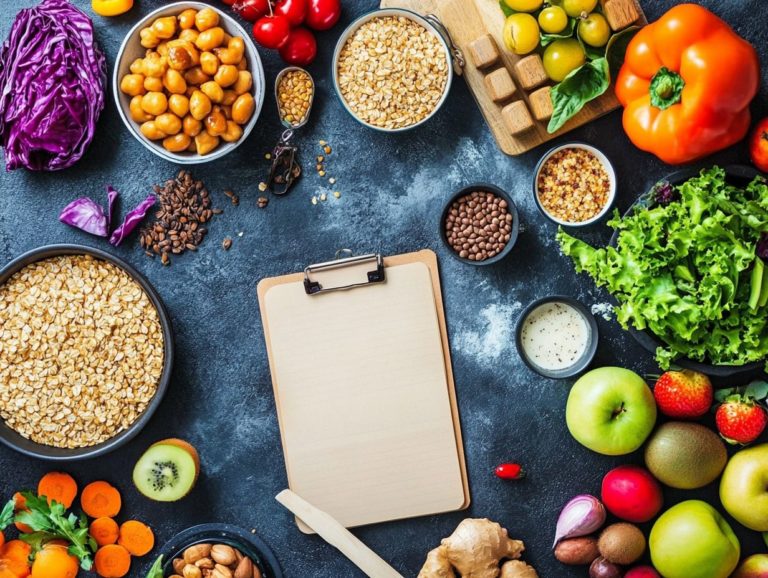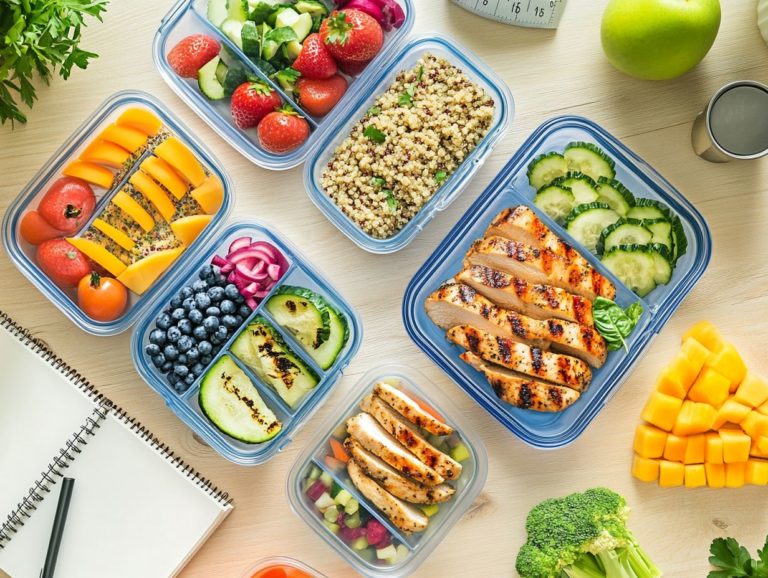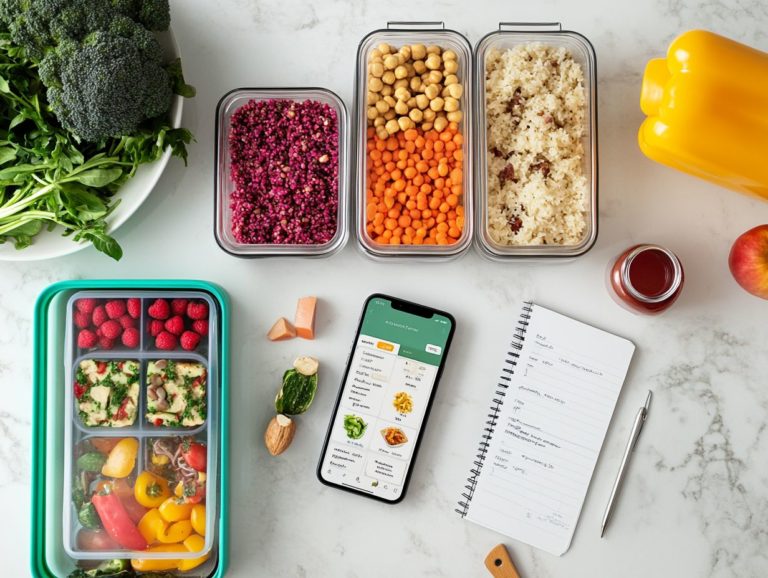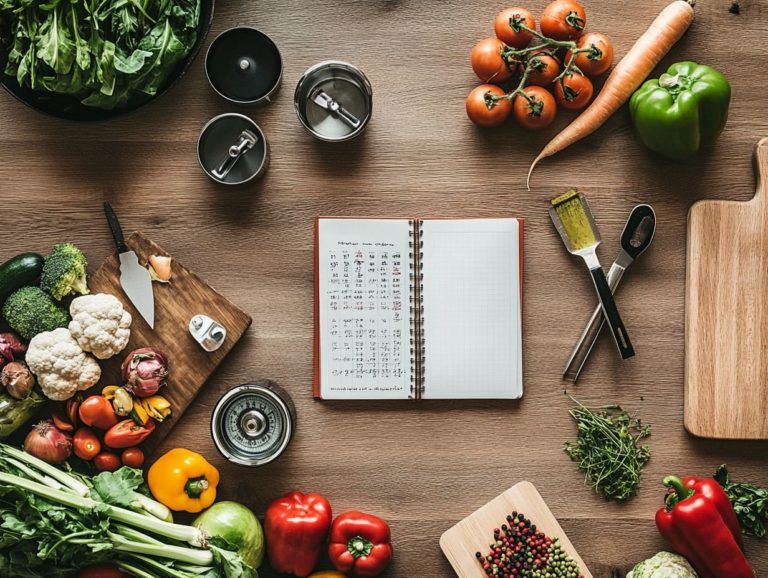Meal Planning for Vegetarians: Tips and Tricks
Exploring a vegetarian diet can be a truly rewarding journey, offering a wealth of health benefits and a positive impact on the environment.
Whether you’re fully dedicated to plant-based living or simply interested in adding more meatless meals to your repertoire, effective meal planning is vital.
This article delves into the essentials of vegetarian diets and provides practical tips for meal prep. You’ll learn how to strike the perfect balance between nutrient intake and enjoyable, delicious dishes.
You’ll discover sample meal plans tailored to various vegetarian lifestyles, making it effortless for you to embark on your culinary adventure.
Contents
- Key Takeaways:
- Benefits of Vegetarian Meal Planning
- Environmental Impact
- Tips for Planning Vegetarian Meals
- Incorporating Plant-Based Proteins
- Balancing Nutrient Intake
- Meal Planning for Different Types of Vegetarians
- Sample Vegetarian Meal Plans
- Vegetarian Meal Prep Tips
- Efficient and Nutritious Meal Prep Strategies
- Frequently Asked Questions
- What is meal planning for vegetarians and why is it important?
- What are some tips for meal planning as a vegetarian?
- How can I make meal planning for vegetarians more budget-friendly?
- What are some common mistakes to avoid when meal planning as a vegetarian?
- How can I ensure my meal plan is nutritionally balanced as a vegetarian?
- Are there any helpful tools or resources for meal planning as a vegetarian?
- Frequently Asked Questions
Key Takeaways:

- Incorporate plant-based proteins to ensure a balanced vegetarian diet and meet daily nutrient needs.
- Consider environmental impact and health benefits when planning vegetarian meals.
- Utilize efficient meal prep strategies to save time and maintain a nutritious diet as a vegetarian.
What is a Vegetarian Diet?
A vegetarian diet excludes meat, fish, and poultry. It focuses on plant-based foods like fruits, vegetables, whole grains, nuts, and legumes such as beans and lentils.
This choice offers a wealth of health benefits, enhances your fiber intake, and delivers a rich array of essential nutrients for your overall well-being.
Many individuals embrace vegetarianism for a variety of reasons, including ethical considerations, health motivations, or environmental concerns. This makes it a popular and adaptable dietary preference.
Within this framework, you ll find variations like lacto-ovo vegetarianism, which includes dairy products and eggs, and veganism, which eliminates all animal products. Important protein sources, such as tofu, chickpeas, and quinoa, become vital allies in maintaining muscle health and keeping your energy levels up.
Meal planning is essential in a vegetarian lifestyle to ensure you’re getting all your necessary nutrients. Don’t shy away from cooking tips! Meal planning for a vegan lifestyle can help you incorporate diverse spices and fresh produce, elevating the flavors and satisfaction of your meals.
If you re contemplating a transition to vegetarianism, consulting a registered dietitian can be invaluable. They can help you meet all your dietary needs while promoting a balanced approach to health.
Benefits of Vegetarian Meal Planning
Vegetarian meal planning presents a wealth of advantages, from enhanced health outcomes to effective weight loss support. It also saves you precious time in your daily cooking routines.
By embracing a diverse array of fruits, vegetables, whole grains, and plant-based proteins, you can savor nutrient-rich meals tailored to your dietary preferences while meeting your specific nutritional requirements.
Thoughtful meal planning minimizes food waste and fosters a more sustainable lifestyle. This allows you to make a positive impact on the planet as you nourish yourself.
Health Advantages
The health advantages of a vegetarian diet are impressive. Benefits include improved weight management, enhanced fiber intake, and a reduced risk of chronic diseases.
By incorporating a variety of plant-based foods such as beans, lentils, and whole grains, you can create nutrient-rich meals filled with vitamins and minerals essential for your overall health. Research indicates that those following a vegetarian diet often enjoy lower cholesterol levels and improved heart health.
Studies suggest that a well-planned vegetarian diet can help you achieve specific health goals. It may reduce your body mass index (BMI) by 1.5 to 2 points compared to meat-inclusive diets. Meal planning becomes essential here. Sticking to dietary guidelines that prioritize fruits, vegetables, and healthy fats can amplify these benefits even further.
Consulting with registered dietitians can offer invaluable guidance. They help you tailor your vegetarian meal choices to meet your unique nutritional needs while still enjoying a balanced and satisfying diet.
Ready to get started? Try out a sample meal plan today!
Environmental Impact
Adopting a vegetarian lifestyle can significantly reduce your environmental footprint. Plant-based diets typically require fewer natural resources and generate lower greenhouse gas emissions compared to meat-centric ones. This shift brings health benefits and fosters sustainable agricultural practices that support the planet’s ecological balance.
By prioritizing vegetarian options, you can play an essential role in environmental conservation and resource preservation. Research indicates that vegetarian diets can lead to substantial reductions in water and land usage critical concerns in today s climate crisis.
If you’re new to this lifestyle, effective meal planning can truly make a difference. Organizing your meals around seasonal vegetables and grains minimizes your environmental impact while maximizing nutritional value.
Transform your grocery shopping into a sustainable practice by opting for local produce. This reduces food miles and supports eco-friendly brands. These small changes can have a big impact in helping anyone embrace a vegetarian lifestyle while minimizing harm to the environment.
Tips for Planning Vegetarian Meals

Effective meal planning for a vegetarian diet requires a thoughtful approach. Start by crafting a comprehensive grocery shopping list and selecting a variety of recipes that pique your interest, including those from nutrition for plant-based families.
Incorporate diverse cooking methods to help you prepare balanced meals. This organized method saves you time and makes cooking fun! By following these meal planning steps, you can simplify your cooking routine, guarantee a nutrient-rich diet, and explore delicious vegetarian options tailored to your preferences.
Incorporating Plant-Based Proteins
Incorporating plant-based proteins into your vegetarian meal plan is essential for adequate nutrition. Sources like beans, lentils, tofu, and chickpeas are protein powerhouses that also provide vital nutrients such as fiber and healthy fats.
Try different sources of protein and explore a variety of recipes to create satisfying meals that support your health and fitness goals. Get creative with these ingredients to elevate your meals and enhance your overall well-being. For instance, add beans to your salads for added protein and texture.
Lentils are perfect for soups or stews, providing a rich source of iron and folate. Marinated and grilled tofu makes an excellent meat substitute, adding a savory touch to stir-fries or grain bowls.
Consider whipping up chickpea-based dishes like hummus as a delicious dip or spread. You can adapt recipes to fit gluten-free or low-carb lifestyles by swapping traditional grains for quinoa or zucchini noodles. Embracing these adaptable methods allows you to create meals that are nutritious and tailored to your dietary preferences.
Balancing Nutrient Intake
Balancing your nutrient intake is essential when planning vegetarian meals. Ensure you receive a wide array of vital vitamins and minerals by incorporating various food groups, such as fruits, vegetables, whole grains, and healthy fats, into your daily menus.
Getting help from a nutrition expert can provide personalized guidance in selecting recipes that align with your dietary needs, leading to improved health outcomes. Use diverse cooking methods like steaming, grilling, and roasting to enhance the natural flavors of your ingredients while preserving their nutritional qualities.
Thoughtful planning makes it easier to adhere to dietary guidelines, resulting in weekly menus that cater to various restrictions or preferences, be it gluten-free, dairy-free, or low-carb. Experimenting with different food combinations broadens your palate and maximizes nutrient absorption, transforming meal times into enjoyable and nourishing experiences.
Start your vegetarian journey today! Your body and the planet will thank you.
Meal Planning for Different Types of Vegetarians
Meal planning for various types of vegetarians, including lacto-ovo vegetarians and vegans, demands a clear understanding of their distinct dietary preferences and requirements.
Each vegetarian diet comes with its own set of guidelines. Lacto-ovo vegetarians enjoy dairy and eggs. In contrast, vegans strictly exclude all animal products. This insight is crucial for crafting personalized meal plans that ensure each vegetarian lifestyle is nutritionally balanced and satisfying.
Vegan, Lacto-Ovo Vegetarian, and More
Vegan diets completely exclude all animal products, while lacto-ovo vegetarians happily include dairy and eggs. This distinction creates diverse dietary paths that cater to your unique preferences and restrictions. Understanding these differences is essential for effective meal planning and ensuring you meet your nutritional needs.
To maintain a balanced diet, it s important for both lifestyles to emphasize a wide variety of fruits, vegetables, whole grains, and plant-based proteins. Pay special attention to nutritional considerations, particularly ensuring you get enough vitamins like B12 and D, which can be a bit tricky for those following a vegan diet.
Regarding meal planning, think about prepping simple recipes like quinoa-stuffed peppers for lunch. For dinner, consider a cozy vegetable curry. Quick cooking tips, such as batch cooking grains and legumes, can be lifesavers, saving you time and reducing stress during busy weekdays.
Learning to read labels helps you navigate dietary restrictions effectively, ensuring every meal is both wholesome and satisfying.
Sample Vegetarian Meal Plans

Sample vegetarian meal plans inspire you to enjoy more plant-based foods in your diet. These plans can be organized weekly or monthly, showcasing a delightful blend of snacks and meals that are not only nutritious but also incredibly flavorful.
By detailing specific meal ideas and recipes, you streamline your grocery shopping and meal preparation, allowing you to savor a rich variety of flavors and nutrients effortlessly.
Weekly and Monthly Meal Planning Ideas
Weekly and monthly meal planning ideas can significantly elevate your vegetarian cooking game, making it remarkably easier to prepare nutritious meals in advance. By harnessing meal prep services or crafting personalized plans, you can save valuable time and alleviate kitchen stress.
This structured approach also enhances your grocery shopping experience, allowing for better management of lists and dietary preferences.
Incorporating various methods and tools for meal planning can lead to impressive results. For example, utilizing meal planning apps can streamline your process, offering features that cater to your planning frequency, grocery price comparisons, and seasonal ingredient suggestions. Try one today and transform your cooking routine!
These digital aids often provide cooking tips designed to maximize flavor with minimal effort. If you have dietary restrictions, it s crucial to ensure a vibrant variety of meals by experimenting with substitutes and looking into international cuisines.
This balance keeps your meals exciting and promotes a diverse and enjoyable culinary journey.
Vegetarian Meal Prep Tips
Vegetarian meal prep tips are invaluable for streamlining your cooking process and ensuring that your meals are both nutritious and convenient. By embracing efficient meal prep strategies like batch cooking and utilizing versatile ingredients you can build a collection of easy healthy recipes tailored to your dietary needs.
Moreover, seeking nutritional counseling offers personalized insights to optimize your meal prep and help you achieve your specific health goals.
Efficient and Nutritious Meal Prep Strategies
Efficient and nutritious meal prep strategies are essential for maintaining a balanced vegetarian diet. These strategies allow you to seamlessly integrate healthy fats and foods rich in nutrients into your daily meals.
To achieve this, consider incorporating techniques such as batch cooking grains and legumes, which form the foundation of many dishes. This approach ensures that protein and fiber are always at your fingertips. You can enhance flavors by using various cooking methods such as steaming, roasting, or stir-frying vegetables, which also preserve those all-important nutrients.
Don t overlook the power of healthy snacks, which can keep your energy levels stable throughout the day and provide the perfect opportunity to include superfoods. Master these meal prep strategies to create exciting, healthy dishes that support your nutritional goals while savoring every delicious bite!
Frequently Asked Questions
What is meal planning for vegetarians and why is it important?

Meal planning for vegetarians involves strategically planning and preparing meals for a certain period of time, typically a week. Implementing meal planning tips for healthy snacking is important as it ensures a balanced and nutritious diet, helps save time and money, and reduces food waste.
What are some tips for meal planning as a vegetarian?
- Incorporate a variety of vegetables, fruits, whole grains, and plant-based protein sources.
- Use seasonal produce for freshness and cost-effectiveness.
- Prepare meals in bulk to save time.
How can I make meal planning for vegetarians more budget-friendly?
- Shop for seasonal produce and buy in bulk.
- Use coupons and discounts.
- Incorporate affordable protein sources such as beans and lentils.
What are some common mistakes to avoid when meal planning as a vegetarian?
- Not including enough protein sources.
- Not incorporating a variety of fruits and vegetables.
- Forgetting to plan for snacks.
How can I ensure my meal plan is nutritionally balanced as a vegetarian?
To ensure your meal plan is nutritionally balanced, include a variety of vegetables, fruits, whole grains, and protein sources. It’s also important to consider nutrients that may be lacking in a vegetarian diet, such as iron and vitamin B12, and supplement if necessary.
Are there any helpful tools or resources for meal planning as a vegetarian?
Yes, there are many helpful tools and resources for meal planning as a vegetarian. Popular options include meal planning apps, vegetarian cookbooks, and online recipe databases. You can also join online communities or forums to get tips and ideas from other vegetarians.
Start your meal planning journey today and transform your vegetarian diet with insights from vegan nutrition: key tips for plant-based diets! Share your tips in the comments below!






